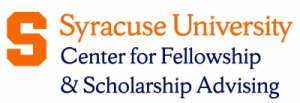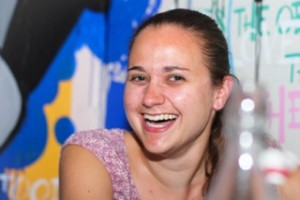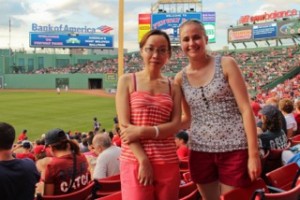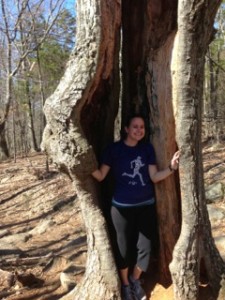6 questions with…Amy Rabideau ’10 (NSF GRFP)
1) How did you hear about the National Science Foundation Graduate Research Fellowship Program (NSF GRFP) and decide to apply?
As dual chemistry and biology major at SU, I was actively involved in chemistry research in Prof. Rob Doyle’s lab. The more I immersed myself in my research, the more I realized that I should give graduate school a try. I spoke with one of the Advisors of the Renee Crown University Honors Program about the opportunities of funding for graduate school. What I did not realize is that some students get paid to go to graduate school! I decided to apply for the NSF GRF to help support my graduate studies in the fall of my senior year.
2) You took the award to a Ph.D. program in Chemistry at MIT. What have been the major benefits of receiving the NSF fellowship?
Now, a fourth year graduate student (how the time flies!), I am still thankful for all the support and guidance that I had as I was applying for scholarships and fellowships. These types of awards help you and your advisor financially as well as bolster your resume.
At MIT, I was the first graduate student in my lab. Starting a new lab presented its own unique set of challenges, including financial, especially with the current state of federal research funding. My NSF GRF takes the financial burden off my advisor and me so we can spend our grant money elsewhere. I suppose this Fellowship has provided me with peace of mind that I will be financially supported to do what I enjoy.
3) What’s been the most surprising part of your graduate study?
I am always learning new things! Not only do I continue to learn new things scientifically, but also I learn more and more about myself everyday. I am constantly challenging myself to try new things and take calculated risks. Sometimes, I think of graduate school is like an endurance test of knowledge and life skills.
4) Tell us about your research and coursework. What’s your weekly schedule like?
After leaving SU, I had sort of an identity crisis—what kind of chemist am I? Insignificant to most, but really troublesome to me. After my first year at MIT, I finally realized that I am a biochemist. At MIT, now that I have passed all my cumulative and qualifying exams, my schedule is the same everyday: go to lab (I even work on weekends!).
My research in Prof. Brad Pentelute’s chemistry lab involves developing a strategy to deliver peptides and proteins into the cytosol of cells. The platform we have developed involves hijacking a protein transport nanomachine from anthrax toxin. I am currently working on transporting different types of peptides and proteins into mammalian cells and analyzing their stability, toxicity, and chemical accessibility.
5) What are you doing for fun?
As many of you know Boston has many colleges in the area, which means the surrounding population is fairly young and lively. There are so many things to do in the Boston area! (And, as a student, there are many opportunities for discounts 🙂 But, the thing I enjoy the most is taking runs around the Charles River.
6) Any advice for SU students applying for the NSF GRFP?
My best advice is to start early on your application! I started on my application the summer before my senior year. There are 3 essays and they all take a significant amount of time to work through. Be sure to address both the “intellectual merit and broader impact” requirements in all your essays! Also, have more than one person read your essays. Sometimes feedback can be hard to take, but I always think it’s better to hear it from a friend or Professor than from an official rejection. Good luck!
NSF GRFP supports students in a variety of fields: STEM disciplines, psychology social sciences including geography anthropology, international relations, political science and more, and STEM education. The award provides generous support for 3 years of research-based graduate study. You can apply as a graduating senior with applications in progress to graduate school (like Amy) or within your first 12 months of a graduate program. CFSA, the Office of Research and the Graduate School will hold an NSF GRFP writing workshop for applicants on October 11th from 3-5 PM. Click over to the “Events” tab for more information and to RSVP.



